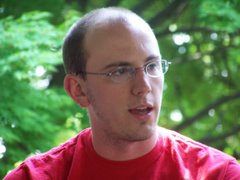- Merton on the bus home...
- Dealing with solitude...
- On Merton and dealing with Goals and Methods in the logical framework...
After saying goodbye to Jesse and Matt and boarding the bus to Gulu, numbed by the din of Kampala's incessant buzz and baked in dust, smoke and scorching sun, I managed to finish Henri Nowen's Encounters with Merton, which I had been picking at for the better part of a month.
Merton was a trappist monk who focused his monastic life on solitude and living the contemplative life, and his writings have been a great complement to my missionary life here, recently. Solitude, as Matt and Jesse were able to affirm in our conversations, can be a new, imposing and strange fact of life for missionaries. Quite unexpectedly, I've found more encounters with solitude here than in any other time in my life, and learning how to live in that has been a real challenge. I think most westerners are uncomfortable with solitude (not just being alone, but alone with oneself, i.e. with the TV off), and especially solitude by circumstance and not by choice. It's often in the evening when others are eating with their families, or Saturdays and holidays, mornings and afternoons while waiting for evening plans.
One of Merton's important sights to me was that God speaks when we are silent, that my mind does not need to spin in order gain from or enjoy my solitude. And ultimately, that it is not a gift meant solely for our own spiritual growth, but like so many gifts of God, given so we may better listen and show compassion to those around us, especially those that normally confuse and anger us.
The last chapter of Encounters, the one read on the heavily listing bus as the sun was setting, focused on Merton's study of Eastern teachings and what they point to in our own Christian tradition. Inevitably I'll fail in conveying the full meaning of Merton's and Chuang Tzu's writings, but let me give a couple illustration.
1) I had a long conversation with an American friend and aid worker here. At length we covered the many and complex challenges facing Northern Uganda. In rhetorical desparation she asked, "So what's the answer? How do we fix this?"
The more one seeks "the good" outside oneself as something to be acquired, the more one is faced with the necessity of discussing, studying, understanding, analyzing the nature of good. The more, therefore, one becomes involved in abstractions and in the confusion of divergent opnions. The more "the good" is objectively analyzed, the more it is treated as something to be attained by special virtuous techniques, the less real it becomes (...) until finally the mere study of the means becomes so demanding that all one's effort must be concentrated on this, and the end is forgotten... This is, in fact, nothing but organized despire..."
- Merton in The way of Chuang Tzu, 23
If you ask 'what ought to be done' and 'what ought not to be done' on earth to produce happiness, I answer that these questions do not have [a fixed and predetermined] answer" to suite every case. If one is in harmony with Tao - the cosmic Tao, "Great Tao" - the answer will make itself clear when the times comes to act, for then one will act not according to the human and conscious mode of deliberation, but to the divine and spontaneous mode of wu wei, which is the mode of action of Tao itself, and is therefore the source of all good.-Merton in The Way of Chuang Tzu, 24


 Despite big plans for Tuesday - renting motorcycles to spend the night by the Nile's Karuma Falls - the terrible violence in Kenya and its ripple effect through East Africa meant gas stations were out of petrol. We would have to kick it local for a few days. We created our own agenda: rediscovered the homespun pleasure of pirated country music videos, explored the market (where donated clothing from home is resold), had a rare and amazing swim and poolside afternoon at Acholi Inn, and ended with a delicious meal.
Despite big plans for Tuesday - renting motorcycles to spend the night by the Nile's Karuma Falls - the terrible violence in Kenya and its ripple effect through East Africa meant gas stations were out of petrol. We would have to kick it local for a few days. We created our own agenda: rediscovered the homespun pleasure of pirated country music videos, explored the market (where donated clothing from home is resold), had a rare and amazing swim and poolside afternoon at Acholi Inn, and ended with a delicious meal.
